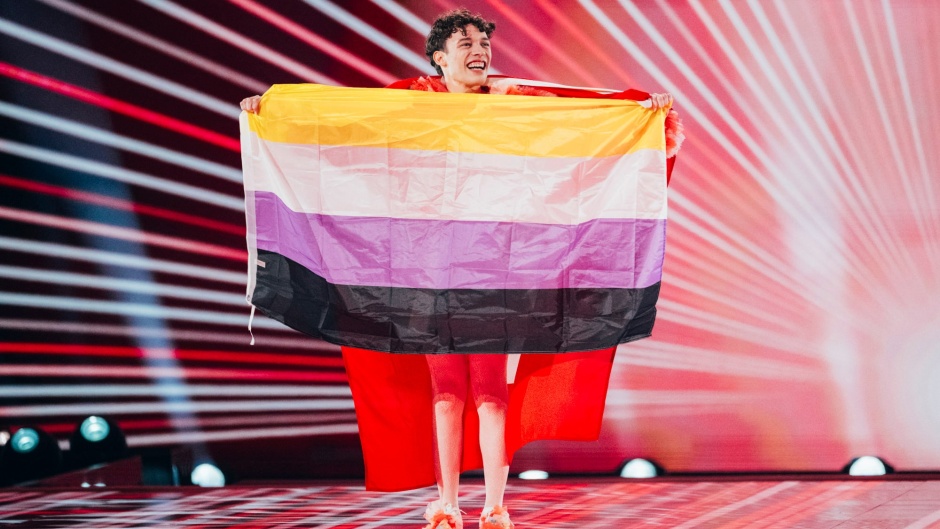In Switzerland, Nemo’s Eurovision victory reopens the debate on a ‘third gender’
Activists and politicians want to allow people to register as ‘non-binary’. An evangelical member of parliament says it would be a mistake: “People’s subjective perceptions can change over time”.
15 MAY 2024 · 17:35 CET

The political debate was closed in 2022 after the national parliament (in Bern's Bundeshaus) said no to introducing a third gender for official documents such as identity cards or passports.
In 2023, the Supreme Court also unanimously rejected an appeal.
But the victory of artist Nemo in last week’s Eurovision Song Contest in Malmö has re-opened the controversy.
Arslan Sibel, the Green politician who in 2017 filed a proposal to “let people register themselves with a third gender”, or alternative eliminate the references to gender from official documents, was among the first to react after Nemo’s victory on Saturday.
“A non-binary person who does not officially exist in Switzerland has won #Eurovision2024 for all of us with #BreakTheCode”, she wrote on social media platform X. “My proposal, which the Federal Council failed to honour, is more relevant than ever. Act now, dear Federal Council”.
Nemo, a ‘non-binary’ icon
The 24-year-old artist from Biel identifies as ‘non-binary’ and describes his own vision of identity in the song that represented Switzerland in the final. “What’s wrong, what’s right?”, the artist sings during the performance of Break the Code, “this story is my truth, I went to hell and back, to find myself on track, I broke the code, whoa-oh-oh”.
An earlier song by Nemo, This Body, is even clearer. “If this body was a house, I’d burn it down, and build myself a place where I’d feel safe”, he sings. “But this body is a doubt, creeping in my mind, trying to tell me how I’m supposed to feel inside”.
In the most watched moment of the Eurovision 2024 gala, as the winner was about to be announced to the hundreds of millions following the event, cameras focused on the Swiss artist holding a ‘non-binary’ flag (yellow, white, purple, and black). Other eight Eurovision stars (including the representatives from Germany, Ireland and Spain) also displayed queer, transgender and ‘non-binary’ symbols to the audience as the final votes were announced.
Petition to Swiss authorities
Soon after Nemo’s success in the song contest, a petition to the government was published in Switzerland, saying: “It is time for Switzerland to officially recognise actual gender diversity”.
The open letter argues that it is not acceptable that people who do not identify as men or women are “forced to have an incorrect entry” in official documents. Signed by over 14’000 people in five days, the supporters include leftist members of the national parliament.
Evangelical parliamentarian: "Self-perception changes over time"
But some are not convinced. Among them is Marc Jost, an evangelical Christian who is one of the two Evangelical People’s Party (EVP) representatives in the Bundeshaus.
“In my opinion, the law should continue to be based on biological sex, as decided by the Federal Council”, says Jost in a piece published on Blick two days after Eurovision. “This is particularly important because people’s subjective perceptions can change over time. Nemo is just one of many examples of this”.
The Christian politician goes on to underline that “non-binary people should be respected” because “every human being has an inviolable dignity, regardless of gender, religion, sexual orientation or gender identity”.
But the best for Switzerland, he added, would be to “improve the situation of people who identify as non-binary without introducing a third gender”.
Politicians of the main conservative group (the Swiss People’s Party) also expressed their opposition to allow people to officially identify beyond their biological sex.
In neighbouring countries Germany and Austria it is already possible to use the “third gender” option in official registries.
One more year
Learn all about our #OneMoreYearEF campaign here (English).
Published in: Evangelical Focus - europe - In Switzerland, Nemo’s Eurovision victory reopens the debate on a ‘third gender’
